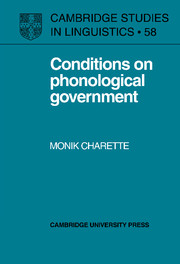Book contents
- Frontmatter
- Contents
- Preface
- Introduction
- 1 A theory of government in phonology
- 2 The ‘e-muet’ in French
- 3 Earlier treatments of schwa
- 4 An analysis of schwa in terms of government
- 5 Licence to govern
- 6 Word-final empty nuclei
- 7 Compounds and phrases
- 8 The alternation between schwa/zero and [ɛ]
- 9 Miscellaneous issues
- Conclusion
- Notes
- References
- Index
- Recent titles in Cambridge Studies in Linguistics
5 - Licence to govern
Published online by Cambridge University Press: 10 December 2009
- Frontmatter
- Contents
- Preface
- Introduction
- 1 A theory of government in phonology
- 2 The ‘e-muet’ in French
- 3 Earlier treatments of schwa
- 4 An analysis of schwa in terms of government
- 5 Licence to govern
- 6 Word-final empty nuclei
- 7 Compounds and phrases
- 8 The alternation between schwa/zero and [ɛ]
- 9 Miscellaneous issues
- Conclusion
- Notes
- References
- Index
- Recent titles in Cambridge Studies in Linguistics
Summary
Introduction
In this chapter I consider word-internal empty nuclei preceded by a consonant cluster. I provide a principled account for the fact that in this context a properly governable empty nucleus fails to be properly governed and receives a phonetic interpretation. To do so I introduce a new notion: government-licensing. I argue that a non-nuclear head can govern a complement only if (i) it has the required charm value or, if charmless, the required complexity, and (ii) it is government-licensed by the nucleus governing it. Government-licensing accounts for, among other things, the phonetic realization of an empty nucleus following a governing onset (i.e. a non-nuclear skeletal point which governs a complement), or for the simplification of a consonant cluster preceding an unrealized empty nucleus. If, in order to govern a complement, a non-nuclear point must be government-licensed and if a properly governed empty nucleus may not be such a licenser, in a situation where a properly governable empty nucleus follows a consonant cluster, the two following possibilities are predicted: (i) in order to government-license the consonant, the empty nucleus will fail to be properly governed, or (ii) proper government will apply, thus preventing the non-nuclear head from governing its complement, which entails the loss of this complement or of this non-nuclear head.
- Type
- Chapter
- Information
- Conditions on Phonological Government , pp. 97 - 118Publisher: Cambridge University PressPrint publication year: 1991



